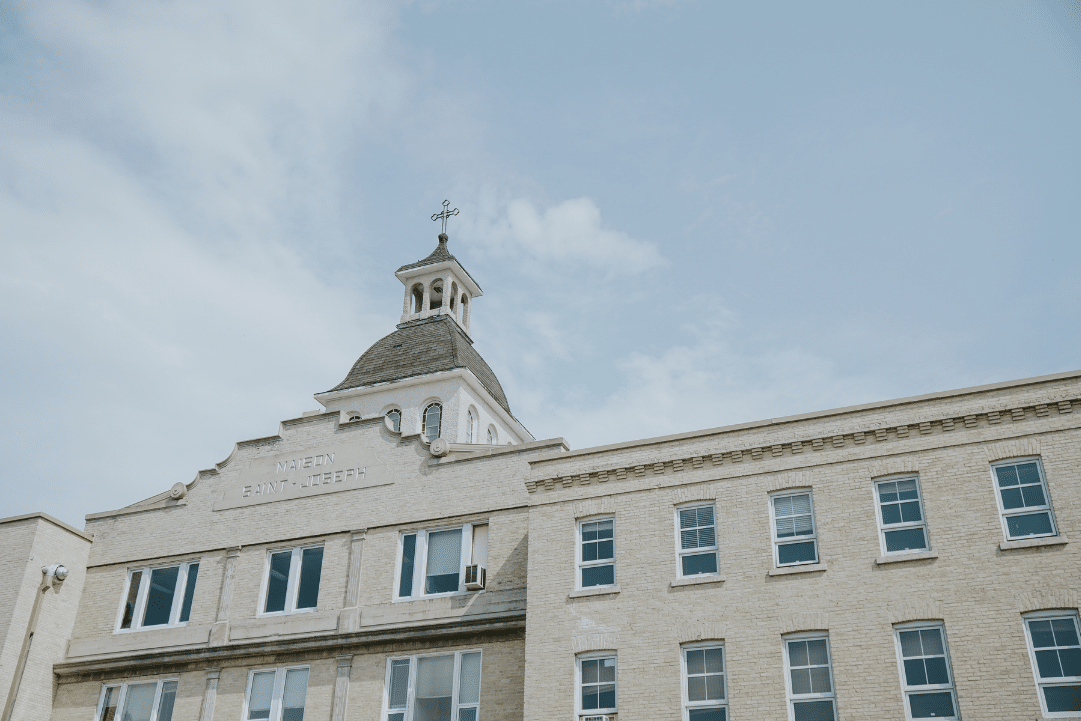Scripture Reference: “When you gather together…wait for one another” (1 Corinthians 11:33).
OTTERBURNE, MB – Rev. Dr. Tim Perry, our new Seminary Dean, recently delivered an inspiring message to our Providence community in a chapel gathering during orientation week. We thought we’d share it with you in his own words.
Have you ever been driven to distraction literally? Have you ever been so annoyed, upset and angry that you’ve not only lost your train of thought, but been left lost for words? Lots of us have lately, I’m sure. When that happens to me, I do two things: (1) I pray to keep my tongue between my teeth and my fingers off my keyboard lest, as James warns, I start a fire I cannot contain; and (2) I give thanks for Saint Paul, who at least twice in his epistles, found himself in just this spot.
The one that has caught my attention lately is the utter exasperation that drips off every page of 1 Corinthians. In this letter, Paul unleashes a devastating rhetorical barrage, deploying sarcasm (1:4-9), rebuke (3:1-9), admonishment (4:14-21), and bafflement (5:1-2) in the letter’s opening chapters. At one point, his frustration so gets the better of him that he either completely loses his train of thought or, as I think more likely, wants the Corinthians to think he has (1:14-17). Why is Paul so upset?
In short, because “the Church of God that is in Corinth,” which had been “sanctified in Christ Jesus,” and was comprised of people “called to be saints,” was embarrassing its pagan neighbors, erecting barriers to their coming to faith in Jesus by their bad behavior. The community had fractured: over favorite preachers, over spiritual gifts, over what to eat, over doctrine, over what to do with a case of egregious and open sin.
They couldn’t even get along when celebrating Holy Communion (1 Cor 11). Here, it looks like the church fractured along lines of class. Wealthier Christians who had plenty and didn’t have to work gathered early and turned what ought to have been a sober celebration into a pagan reverie with lots of bread and wine to go around. On the other hand, poor believers who could only arrive after their day’s labor ended, found the food and drink already consumed. “I do not commend you,” writes Paul, “because when you come together it is not for the better but for the worse” (11:17). To Paul’s rhetorical arsenal, we can now add understatement, I think.
So what’s the solution? Paul’s is threefold. Most of all, the Corinthian believers needed a rightly ordered Eucharist (11:23-26) integrated with a regular, rigorous examination of conscience (11:17-32) to right the ship. This was not a lightly baptized idol-banquet, where each did what they would. This was the solemn reenactment of the Last Supper through which the Lord Jesus inaugurated the New Covenant. It was nothing less than proclamation of the Lord’s death. Such was its gravity that the believers needed to prepare beforehand and comport themselves appropriately during the sacrament. In Corinth’s immediate context, such comportment looked like this: “when you come together…wait for one another.” Don’t rush ahead, in other words.
Providence, like so many localities, families, churches and service groups, is a community divided over vaccines. I don’t know the science well enough to instruct anyone and so I don’t; like everyone on all sides, I have to rely on people I trust who know more about these things than I do and then make a decision. I have dear friends and family who have made a decision different than mine. They are not wicked or stupid. Neither am I. I do not love my neighbor or my children more than they do theirs. It’s not a question of whether we should “allow” disagreement. It’s here.
Furthermore, the vaccination debate is an issue tangential to the Gospel. No truth of the faith is at stake in moving one way or the other. It therefore ought not to lead to the kind of speech that I have heard here. Providence’s President, Cabinet and Board made a decision about vaccines together. They did so based on a prudential weighing of several issues: the advice of experts in the science whom we trust, the welfare of our students, faculty and staff, and frankly, the strong desire to avoid litigation in the event of a COVID outbreak on our campus. They did so prayerfully and in submission to the Scriptures. Providence has some supporters who want this policy to be stronger; it has others who think the policy is far too strong. And we have some who have chosen to express these convictions in ways that imply that those who disagree are wicked, stupid, or both.
Providence isn’t a gathered church in the strict sense; it isn’t a eucharistic community. Still, I wonder whether some of Paul’s advice wouldn’t apply here. Would he commend us in our conduct or not? Doesn’t “I love my neighbor” sound a lot like “I am of Apollos?” How about “I believe in science”—does it call to mind “I am of Christ?” How about “I won’t be driven by fear,” or the newly repurposed, “my body my choice?” Slogans about an issue tangential to the Gospel are being thrown about in a way that ought to embarrass us into silence. Their use might even suggest that “science” and “freedom” are encroaching on a loyalty owed only to God. I hope Paul wouldn’t go so far as to say, “I thank God I baptized none of you,” but no, I don’t think he would commend us.
Instead, I think he would remind us that when we gather, we should wait for one another. Our community leaders have made a decision about vaccinations with care and due diligence. I believe it to be the right decision. And I will not speak ill of those who believe the decision has been made prematurely or erroneously. Not least because I know I might be wrong and that judgment ultimately belongs to Someone Else. Will you join me? Will you wait with me?
During my first year in parish ministry, I oversaw a church split. It was awful. Polarization was as extreme as it was unnecessary. Gifted and godly people were on both sides. When the dust settled, our parish had lost two families, strained relations with several more, and sidelined three important lay leaders. The presenting issue was much like one of those in Corinth: food. After it was all over, I went to lunch with the local Catholic priest, Father Jim, to debrief. At the end of my tale of woe, he had a one-sentence response: “Oh Tim, if the Evil One can’t come in through the liturgy, he’ll come in through the kitchen.”
I’m not policing your conscience. I have enough trouble policing my own. I am asking you for as long as it takes, to wait with me whether you agree with me or not. Even more, I ask you to pray for me that my words and conduct will not become an invitation for the Evil One to sow more dissension. And I’m promising to do the same for you.


